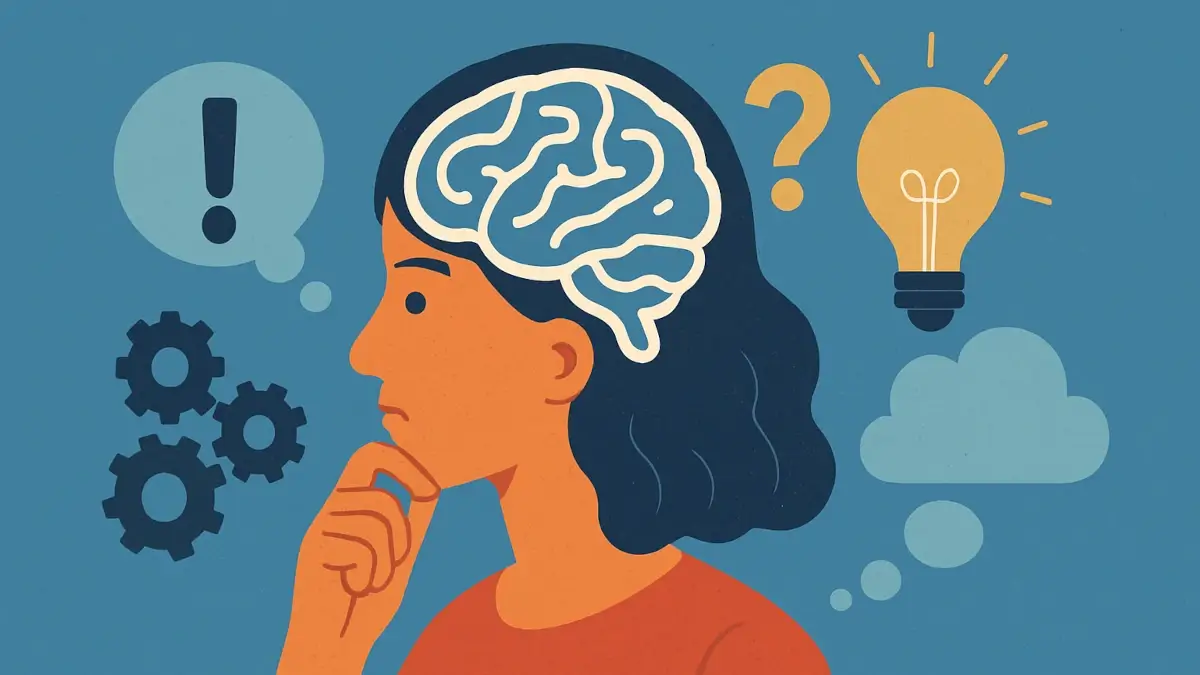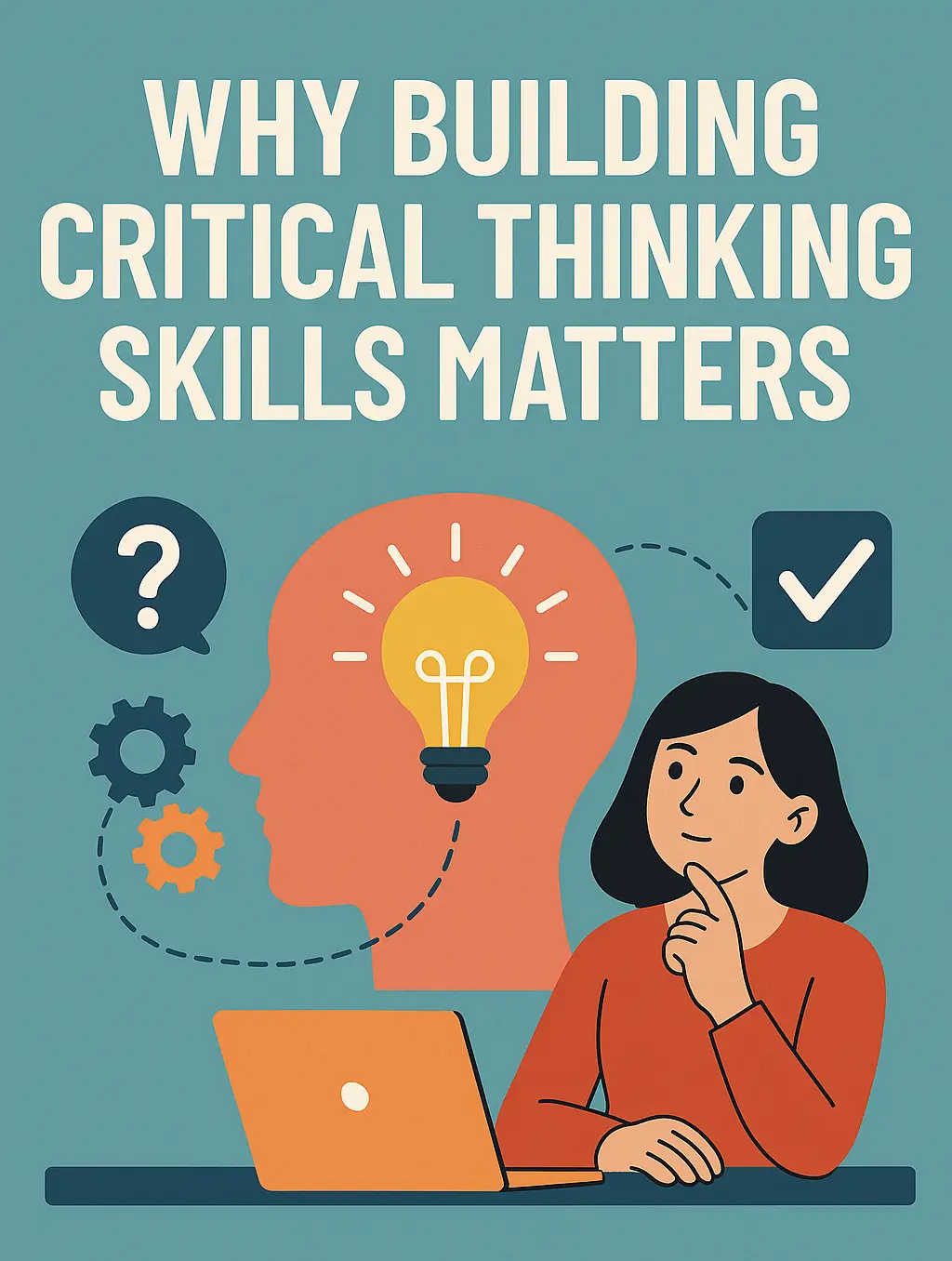In a world flooded with information, opinions, and complex challenges, the ability to think clearly and independently is a superpower. Critical thinking is not about being critical of others—it’s about evaluating information objectively, thinking rationally, and making sound decisions. It’s what separates knee-jerk reactions from thoughtful responses, and it’s a skill that anyone can develop with practice.
So how exactly do you build your critical thinking skills?
In this article, we’ll break it down step-by-step. Whether you’re a student, a professional, or simply someone looking to make smarter decisions in life, these strategies will help you think more critically—and more confidently.
What is Critical Thinking?
Before jumping into how to build it, let’s clarify what critical thinking means.

Critical thinking is the ability to objectively analyze and evaluate information to form a reasoned judgment. It involves observation, interpretation, analysis, inference, evaluation, explanation, and reflection.
Think of it as thinking about your thinking—being aware of how you process information, challenge assumptions, and arrive at conclusions.
Why Building Critical Thinking Skills Matters?

- Improves decision-making in personal and professional life
- Strengthens problem-solving abilities
- Helps identify biases and logical fallacies
- Leads to more effective communication
- Encourages open-mindedness and intellectual humility
- Boosts creativity and innovation
In short, critical thinking enhances every area of your life—from how you interpret the news to how you resolve conflicts, plan your goals, or evaluate risks.
How to Build Your Critical Thinking Skills: 10 Practical Strategies.
1. Start With Self-Awareness.
Critical thinking begins with understanding your own beliefs, assumptions, and cognitive biases. We all view the world through personal filters shaped by experience, culture, and emotion.
Ask Yourself:
- What beliefs do I hold that influence how I interpret information?
- Am I emotionally attached to a particular outcome?
- Could I be wrong?
Developing self-awareness allows you to detach from knee-jerk reactions and engage in deeper analysis.
2. Ask Better Questions.
The quality of your thinking is shaped by the quality of your questions. Great thinkers are great questioners. When you come across new information, don’t just accept it—interrogate it.
Try asking:
- What is the evidence for this?
- Who is the source? Are they credible?
- What are the counterarguments?
- What’s missing from this explanation?
Practicing Socratic questioning—a method of disciplined inquiry—can help unpack layers of thought and get to the root of issues.
3. Slow Down Your Thinking.
We live in a fast-paced world that often rewards speed over thoughtfulness. But fast thinking (as psychologist Daniel Kahneman calls it) relies on intuition and shortcuts, which can lead to mistakes.
To improve your critical thinking:
- Pause before reacting or making decisions.
- Take time to gather information and assess it.
- Sleep on important decisions when possible.
Deliberate, slow thinking leads to better outcomes, especially in high-stakes situations.
4. Seek Out Diverse Perspectives.
One of the most powerful ways to sharpen your thinking is by exposing yourself to different viewpoints. This expands your understanding and challenges blind spots.
Action Steps:
- Read books, articles, and essays that present opposing views.
- Have respectful debates with people who think differently.
- Watch documentaries or podcasts outside your usual interests.
Diverse perspectives don’t weaken your thinking—they strengthen it by forcing you to refine your arguments or reconsider them entirely.
5. Recognize and Challenge Assumptions.
We all operate on assumptions—some valid, some flawed. Being able to spot and question these assumptions is critical to improving your thought process.
Examples:
- “That product must be good because it’s expensive.” (Is price always linked to quality?)
- “I’ve always done it this way, so it must be the best way.” (Is tradition always the best guide?)
Try playing “devil’s advocate” with your own thinking: intentionally argue against your position to test its strength.
6. Learn the Basics of Logic and Argumentation.
Understanding logic helps you structure your thinking and avoid flawed reasoning. This includes recognizing logical fallacies, such as:
- Strawman: Misrepresenting someone’s argument to make it easier to attack.
- Ad hominem: Attacking the person instead of the argument.
- Appeal to authority: Believing a claim because an authority figure says so, without evidence.
Quick Tip:
Study common logical fallacies and learn how to identify them in debates, articles, advertisements, and even in your own reasoning.
7. Practice Active Listening.
Critical thinking isn’t just about how you form thoughts—it’s also about how you receive them.
Active listening means fully concentrating, understanding, and responding thoughtfully during conversations. It involves:
- Avoiding interruptions
- Asking clarifying questions
- Reflecting on what’s said before responding
By truly listening, you gain more accurate information to work with—and show respect for others’ viewpoints.
8. Keep a Thinking Journal.
Writing is a powerful way to clarify your thoughts and reflect on your reasoning.
Start a journal where you:
- Reflect on decisions you’ve made
- Analyze arguments or debates
- Explore your beliefs and how they’re evolving
- Write about problems and break them down step by step
Even 10 minutes of writing a day can improve your ability to think clearly and express yourself better.
9. Apply the Scientific Method to Everyday Problems.
The scientific method isn’t just for scientists—it’s a powerful thinking tool for anyone.
How to use it:
- Ask a question (What’s the problem?)
- Do background research (What do I already know?)
- Form a hypothesis (What do I think is happening?)
- Test with evidence (Can I gather data or feedback?)
- Analyze and conclude (What does the evidence show?)
Whether you’re deciding which workout routine is more effective or figuring out why your team is missing deadlines, this approach brings clarity.
10. Make Critical Thinking a Habit.
Like any skill, critical thinking gets stronger with regular use. Make it part of your daily life.
Habits to build:
- Fact-check before sharing information online
- Pause and reflect before making major decisions
- Read one thought-provoking article or book chapter each day
- Discuss ideas, not just events or people, with friends and colleagues
The goal is to turn critical thinking from a tool into a mindset—a way of approaching the world with curiosity, reason, and integrity.
Bonus: Critical Thinking in the Digital Age.
The internet has revolutionized how we access information—but it’s also made us more vulnerable to misinformation, bias, and cognitive overload.
Here’s how critical thinking can help you thrive online:
- Evaluate sources: Who wrote it? What’s their agenda?
- Check for evidence: Are claims backed by data or expert consensus?
- Look beyond headlines: Read full articles before forming an opinion.
- Avoid echo chambers: Follow people you disagree with to challenge your thinking.
In a digital world where algorithms feed you what you like, critical thinking helps you see what you need.
Final Thoughts.
Critical thinking isn’t about having all the answers—it’s about asking better questions, thinking deeply, and staying open to learning. It’s a powerful skill that helps you navigate uncertainty, solve problems, and lead a more intentional life.
Building it takes time, effort, and a willingness to reflect—but the payoff is immense. When you think critically, you don’t just react to the world—you understand it, engage with it, and shape it more wisely.
Remember:
- Be curious.
- Question assumptions.
- Seek evidence.
- Stay humble.
- Think before you decide.
The quality of your thoughts determines the quality of your life.
Leave a Reply